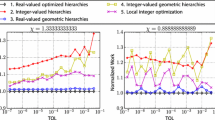Abstract
Engineering problems are often characterized by significant uncertainty in their material parameters. A typical example coming from geotechnical engineering is the slope stability problem where the soil’s cohesion is modeled as a random field. An efficient manner to account for this uncertainty is the novel sampling method called p-refined Multilevel Quasi-Monte Carlo (p-MLQMC). The p-MLQMC method uses a hierarchy of p-refined finite element meshes combined with a deterministic Quasi-Monte Carlo sampling rule. This combination yields a significant computational cost reduction with respect to classic Multilevel Monte Carlo. However, in previous work, not enough consideration was given to how to incorporate the uncertainty, modeled as a random field, in the finite element model with the p-MLQMC method. In the present work we investigate how this can be adequately achieved by means of the integration point method. We therefore investigate how the evaluation points of the random field are to be selected in order to obtain a variance reduction over the levels. We consider three different approaches. These approaches will be benchmarked on a slope stability problem in terms of computational runtime. We find that for a given tolerance the local nested approach yields a speedup up to a factor five with respect to the non-nested approach.
Access this chapter
Tax calculation will be finalised at checkout
Purchases are for personal use only
Similar content being viewed by others
References
Blondeel, P., Robbe, P., Van hoorickx, C., François, S., Lombaert, G., Vandewalle, S.: p-refined multilevel Quasi-Monte Carlo for Galerkin finite element methods with applications in civil engineering. Algorithms 13(5) (2020). https://doi.org/10.3390/a13050110, https://www.mdpi.com/1999-4893/13/5/110
de Borst, R., Crisfield, M.A., Remmers, J.J.C.: Non Linear Finite Element Analysis of Solids and Structures. Wiley, U.K. (2012)
Burkardt, J.: Matlab implementation of Wandzura rule (2007). Online https://people.math.sc.edu/Burkardt/m_src/triangle_wandzura_rule/triangle_wandzura_rule.html. Accessed 01 Oct 2020
Cliffe, K.A., Giles, M.B., Scheichl, R., Teckentrup, A.L.: Multilevel Monte Carlo methods and applications to elliptic PDEs with random coefficients. Comput. Vis. Sci. 14(1), 3 (2011). https://doi.org/10.1007/s00791-011-0160-x
Dunavant, D.A.: High degree efficient symmetrical Gaussian quadrature rules for the triangle. Int. J. Numer. Meth. Eng. 21(6), 1129–1148 (1985). https://doi.org/10.1002/nme.1620210612
Geuzaine, C., Remacle, J.F.: Gmsh: A 3-d finite element mesh generator with built-in pre- and post-processing facilities. Int. J. Numer. Meth. Eng. 79(11), 1309–1331 (2009). https://doi.org/10.1002/nme.2579
Giles, M.B.: Multilevel Monte Carlo path simulation. Oper. Res. 56(3), 607–617 (2008). https://doi.org/10.1287/opre.1070.0496
Giles, M.B.: Multilevel Monte Carlo methods. Acta Num. 24, 259–328 (2015). https://doi.org/10.1017/S096249291500001X
Giles, M.B., Waterhouse, B.J.: Multilevel Quasi-Monte Carlo path simulation. Rad. Ser. Comput. App. 8, 1–18 (2009)
Kuo, F.: Lattice rule generating vectors (2007). Online https://web.maths.unsw.edu.au/~fkuo/lattice/index.html and https://web.maths.unsw.edu.au/~fkuo/lattice/lattice-32001-1024-1048576.3600. Accessed 12 Apr 2019
Li, C., Kiureghian, A.D.: Optimal discretization of random fields. J. Eng. Mech. 119(6), 1136–1154 (1993). https://doi.org/10.1061/(ASCE)0733-9399(1993)119:6(1136)
MATLAB: version 9.2.0 (R2017a). The MathWorks Inc., Natick, Massachusetts (2017)
Matthies, H.G., Brenner, C.E., Bucher, C.G., Guedes Soares, C.: Uncertainties in probabilistic numerical analysis of structures and solids-stochastic finite elements. Struct. Saf. 19(3), 283–336 (1997)
Robbe, P.: Gaussianrandomfields.jl (2017). Online https://github.com/PieterjanRobbe/GaussianRandomFields.jl. Accessed 05 Nov 2020
Robbe, P.: Multilevelestimators.jl (2018). Online https://github.com/PieterjanRobbe/MultilevelEstimators.jl. Accessed 05 Nov 2020
Wandzurat, S., Xiao, H.: Symmetric quadrature rules on a triangle. Comput. Math. Appl. 45(12), 1829–1840 (2003). https://doi.org/10.1016/S0898-1221(03)90004-6
Whenham, V., De Vos, M., Legrand, C., Charlier, R., Maertens, J., Verbrugge, J.C.: Influence of soil suction on trench stability. In: Schanz, T. (ed.) Experimental Unsaturated Soil Mechanics, pp. 495–501. Springer, Berlin (2007)
Acknowledgements
The authors gratefully acknowledge the support from the Research Council of KU Leuven through project C16/17/008 “Efficient methods for large-scale PDE-constrained optimization in the presence of uncertainty and complex technological constraints”. The computational resources and services used in this work were provided by the VSC (Flemish Supercomputer Center), funded by the Research Foundation—Flanders (FWO) and the Flemish Government—department EWI.
Author information
Authors and Affiliations
Corresponding author
Editor information
Editors and Affiliations
Rights and permissions
Copyright information
© 2022 The Author(s), under exclusive license to Springer Nature Switzerland AG
About this paper
Cite this paper
Blondeel, P., Robbe, P., François, S., Lombaert, G., Vandewalle, S. (2022). On the Selection of Random Field Evaluation Points in the p-MLQMC Method. In: Keller, A. (eds) Monte Carlo and Quasi-Monte Carlo Methods. MCQMC 2020. Springer Proceedings in Mathematics & Statistics, vol 387. Springer, Cham. https://doi.org/10.1007/978-3-030-98319-2_9
Download citation
DOI: https://doi.org/10.1007/978-3-030-98319-2_9
Published:
Publisher Name: Springer, Cham
Print ISBN: 978-3-030-98318-5
Online ISBN: 978-3-030-98319-2
eBook Packages: Mathematics and StatisticsMathematics and Statistics (R0)




